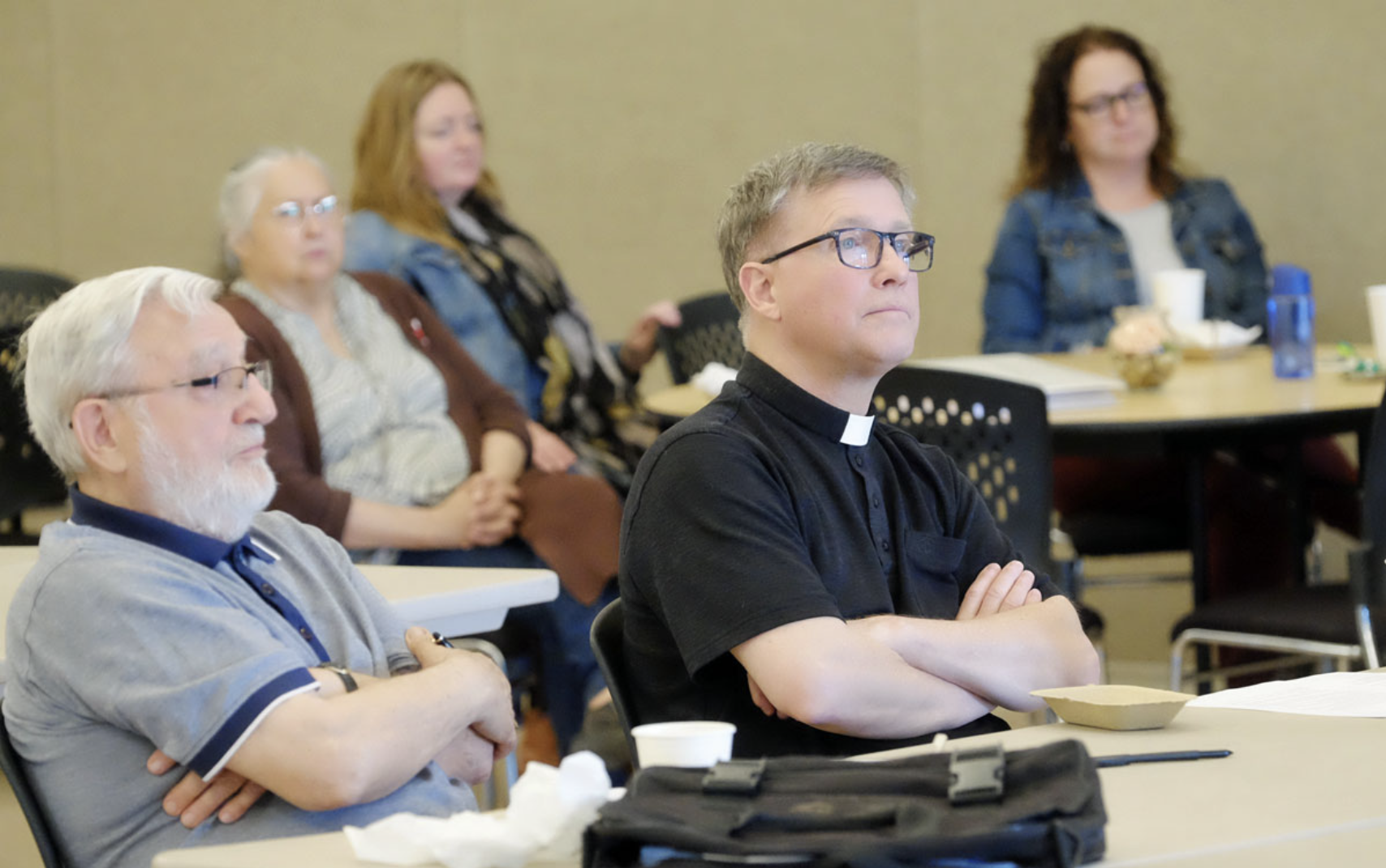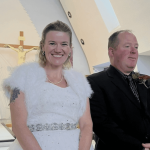SASKATOON, SASK. — From preserving Cree language to nurturing Indigenous youth through traditional camps and elder-led teachings, Catholic-funded initiatives in the Diocese of Saskatoon are advancing healing and reconciliation, and doing it ahead of schedule.
The impact of grants from the Indigenous Reconciliation Fund in the diocese, especially for children, families, and Indigenous language and culture, was highlighted at a partnership appreciation event May 23 at the Cathedral of the Holy Family.
The diocesan commitment towards a $30 million national Indigenous Reconciliation Fund (IRF) established by the Catholic Bishops of Canada is to raise $1.25 million over five years. Reconciliation supporters and partners heard that the diocese was only $60,000 short of its goal as of the May 23 gathering, well before the five-year deadline.
The afternoon program included information about the goals and process for the fund, as well as presentation about some of the local projects that have been supported by the fund over the past three years, and how that support is making a difference.
The partnership gathering is one of the Discernment Circle annual events rooted in its covenant statement.
Myron Rogal, diocesan coordinator of Justice and Peace, introduced MC Kelley Cardinal, co-chair of the Indigenous-led diocesan Discernment Circle, who opened the event with words of welcome to Elders, knowledge keepers, partners, donors, parish reconciliation committee members, and members of the Discernment Circle and Granting Committee.
Discernment Circle member Elder Irene Sharp of Our Lady of Guadalupe Indigenous Catholic Parish in Saskatoon offered both the opening and closing prayer for the afternoon event.
Fr. Kevin McGee, Vicar-General for the Roman Catholic Diocese of Saskatoon, brought greetings from Bishop Mark Hagemoen, who was out of the diocese and unable to attend.
McGee read a message from the bishop emphasizing the importance of the relationship-building that has accompanied the IRF fund-raising and granting process.
“The aim of the fund is of course to provide financial support to efforts by various local Indigenous groups and organizations to further outcomes as defined in the related Calls to Action of the Truth and Reconciliation Commission,” wrote Bishop Hagemoen. “However, a theme emphasized repeatedly by our Circle members is to develop relationships with local Indigenous groups and organizations. As often stated, the financial investments – as modest as they are from our fund – are secondary to building and expanding our relationships and dialogues,” noted the bishop’s message read by McGee.
TRC work of the diocesan Discernment Circle
Discernment Circle co-chair Gordon Martell offered an overview of the Indigenous Reconciliation Fund and its goals and administration in the diocese, including the covenant that guides the work of the Discernment Circle overseeing the local efforts.
“We are coming to the end of the third year of our mandate,” said Martell. “And over that time we have funded projects that foster reconciliation and discourse between Indigenous and non-Indigenous peoples, we have funded projects that support the development, protection, and proliferation of Indigenous languages, we have supported projects that have provided land-based learning opportunities and cultural learning for Indigenous children and youth and families. We’ve funded projects that connect families to cultural teachings, healing circles, and traditional parenting practices. We’ve provided supports for people experiencing homelessness, we have funded projects that support relationships between Indigenous and newcomer Canadians. We funded projects that address food insecurity in the community, and we’ve funded projects – one of which you are going to hear about today – that address learning outcome disparities that some Indigenous children experience.”
Martell noted that there is an open call for grant applications throughout the year, with four intake periods. “We aim to distribute about $250,000 per year to be able to ensure we have available resources through the life of our initiative,” he said.
Applicants must be a registered charity or work with a registered charity, he noted. Priorities include healing and reconciliation for communities and families, culture and language revitalization, education and community building, and dialogues involving Indigenous Elders, spiritual leaders and youth with a focus on Indigenous spirituality and culture.
In addition to co-chairs Kelley Cardinal and Gordon Martell, the Indigenous-led IRF Discernment Circle includes Sandi Harper, Deacon Harry Lafond, Deacon Dan Lamoureux, Lyndon Linklater, MaryAnne Morrison, Irene Sharp, Delores Smallchild, and Carol Zubiak, and two ex-officio (non-voting) members: Bishop Mark Hagemoen, and Myron Rogal.
Cardinal, Martell, Lafond, and Bev Canaday serve on the Circle’s granting committee, along with ex-fficio (non-voting) members Hagemoen and Rogal.
Martell expressed his appreciation to those serving on the IRF Discernment Circle and its granting committee, as well as to diocesan staff, in particular the fund-raising staff of the Diocese of Saskatoon Catholic Foundation.
Summer Success Literacy Camp
Kurt Wintermute, Chair of Saskatoon United Way, and Gary Beaudin, United Way Director of Community Impact, described a summer literacy project supported by the diocesan IRF ($50,000 grant in Year 2)
Targeted at children in Grades 2 and 3 at risk of falling behind in their reading over the summer, the United Way program offers a two-week summer day camp with qualified teachers joining volunteers to offer the program.
“This initiative was started back in 2016, in partnership with the Catholic school board. To date there have been over 700 students who have benefited from the camps, and 90 per cent of those identified as Indigenous,” he said. The camp also is linked to a summer snack program.
“Research shows that students who fall behind in Grades 2 and 3, have a very much more difficult time trying to get caught up, and eventually graduate,” he said. “We are dealing with situations in Canada where Indigenous children have a graduation rate of around 50 per cent. This lower graduation rate reflects generational harms that have been experienced by Indigenous peoples and the lasting impact of Residential Schools.”
Wintermute added: “The support that is provided (by the IRF) allows us to enrich the program for vital First Nations cultural and language supports, things that are crucial for reconciliation to happen.”
United Way Community Impact Director Beaudin pointed to two outcomes of the Summer Success Literacy Camp — it both maintains reading skills and provides cultural enrichment. It is a blessing for children who otherwise would not have an opportunity or family resources for this kind of summer activity.
“It is mostly about keeping an interest in reading and maintaining some of the skills that kids had over the summer in literacy…. The other half is the opportunity to bring culture and language to the kids throughout the summer in the program,” he said,
Drumming circles, powwow dancing demonstrations, and other resources are integrated into the two-week camp, he said. “That mesh between learning, schools, culture and language is ideal – and creates a very positive association for kids to take away.”
The program also involves parents and families, and strengthens commitment to reading at home as well, he said. Nutrition is also a big part of the program, Beaudin added, noting that summer is a time without the breakfast, lunch, and snack programs that children benefit from in school.
“It is really important that we feed the kids too – food, culture, language, literacy, families – it is a great combination,” he said. “In terms of food, a Cree or nêhiyaw way of thinking is that food is something to be shared; it is not commodified, it is shared,”
Keeping Language Alive
For three years in a row, diocesan IRF grants have gone to assist the YXE Cree Speakers Society in putting on the “pimâcihitâtân nêhiyawêwin: Keep Our Language Alive” conference: $15,000 in Year 1; $18,000 in Year 2; and $20,000 in Year 3.
Since Indigenous organizers were busy with the upcoming sold-out language conference, Myron Rogal read the group’s written testimony about the project, its goals, and its importance to the path of healing and reconciliation.
“YXE Cree Speakers Society was founded in 2021 by Milton Tootoosis, a nêhiyaw of the Poundmaker Cree Nation in Treaty Six Territory, with the goal to revitalize the Plains Cree language and promote the teachings of Cree Elders and traditional speakers,” said the statement read by Rogal.
The society’s work has included research and engagement related to Cree language, including surveys and round table discussions about introducing innovative methods to support the Pains Cree (Y dialect) language development and retention. IRF funds have gone towards supporting the annual grassroots language conference.
“For the past three years, the society has been bringing together Indigenous leaders, teachers, and advocates from across Cree communities, and aspiring Cree language speakers to learn and network through the pimâcihitâtân nêhiyawêwin Keep Our Language Alive conference,” said the statement.
“Our over-arching goal has been to inspire aspiring speakers, teachers, and instructors, community leaders, and policy makers in their journey to reinvigorate Indigenous language development, and to further strengthen the ties between Cree culture and mainstream education, providing a pathway for future integration.”
Nîkânîwin Mentorship Program
Kara Lackie Director of Development for Big Brothers Big Sisters (BBBS) Saskatoon described the new Nîkânîwin Mentorship Program launched this year in a partnership between BBBS and Indigenous Sport Saskatchewwan. The program received a $35,000 Year 3 grant from the diocesan IRF.
The Nîkânîwin Leadership Program is focused on empowering Indigenous youth aged 8-12 through cultural enrichment, connection to language, physical activity, and mentorship. It runs as a group program in the community or at local schools twice a week over the course of 10 weeks,
Less than a year old, Nîkânîwin (a Cree word meaning ‘to lead’) was created in response to a recognized need for greater Indigenous programming and involvement in the BBBS mentoring model, said Lackie.
“About 80 per cent of the youth that we serve in all of our programs are Indigenous. As an organization for many years we knew and felt that we were not the right people to lead how best to mentor and support Indigenous youth. We have expertise in mentorship, but we knew that it would take true partnership to form something that was truly unique, which is how Nîkânîwin came to be.” Indigenous Sport Saskatchewan has led the way, she said.
She added: “The work we do is deeply relational and our partners at Indigenous Sport Saskatchewan reminded us that we must create space for Indigenous communities to define their own needs and pathways forward. Our role at BBBS is not to lead on their behalf but it is truly to walk beside them offering resources and assistance.”
This year Nîkânîwin involved 36 Indigenous youth and trained over 70 Indigenous mentors through partnership with SUNTEP (Saskatchewan Urban Native Teacher Education Program), ITEP (Indigenous Teacher Education Program) and some other organizations in the community.
“The donor supported work of this program — as it is fully funded by donors in our community — is something that is truly remarkable and growing. We are focused on rolling out our program across Saskatchewan, and the interest has been outstanding. We are just trying to figure out how we keep up with the capacity. Our goal before the end of 2025 is to run an additional ten group programs in Saskatoon, which would serve over 120 youth, and train 40 new mentors.”
Connecting Indigenous Elders with Newcomers to Canada
Moses Ahiabu, Executive Assistant at Peoples Bridge Advocacy described the series of Truth and Reconciliation and Indigenous traditional learning activities that have been developed and led by Elders, Knowledge Keepers and educators, with support from diocesan IRF grants $35,800 in Year 1; $21,500 in Year 2; and $21,500 in Year 3.
Bringing together hundreds of participants in a diverse group of newcomers and others, the Peoples Bridge Advocacy series is focused on “relationship-building guided by Indigenous Elders, prayers, ceremony, deepening awareness of residential school systems, and their ongoing legacy, and what has happened with reconciliation,” Ahiabu said.
“This moment of connection has strengthened our cultural community, inspiring ally-ship and encouraging communities new to this land, to become active participants in the reconciliation journey.”
“We also want to extend our heartfelt thanks to the diocesan reconciliation fund and the Roman Catholic Diocese of Saskatoon for their continued financial support, and for everyone who was alongside,” said Ahiabu.
Nutrition support at St. Mary Wellness and Education Centre
In Year 2, a diocesan IRF grant of $20,000 went to St. Mary Wellness and Education Centre for “Micisowin,” a collective kitchen that address food insecurity, while also creating spaces for community members to gather in an inter-generational setting where cultural transmission of knowledge takes place.
Because St. Mary principal Jesse Baptist was tied up at a school track and field meet, MC Kelley Cardinal of the IRF Discernment Circle spoke on behalf of the school, where she also served on the administration team. “St Mary’s Wellness and Education Centre is a school with a high Indigenous population – the particular grant that they applied for was nutrition support. Oftentimes there is a lot of food insecurity in the community.”
Cultural teachings and traditional parenting
Haven Indigenous Family Connections, which works to strengthen and preserve families in need, received a diocesan IRF grant of $57, 500 in Year 1 and $55,500 — funds that were vital to the operation of programs for Indigenous families, said Haven executive director Dionne Miazdyck-Shield.
“Several years ago, when we reflected on what our new mission and vision should be, we looked to the Truth and Reconciliation Commission and the Calls to Action — specifically the first section about child welfare and reducing that impact,” said Miazdyck-Shield. “Our work is prevention work, trying to support families who are at risk to maintain custody of their kids, to help get their kids back if they are in care, and to reduce the need for child protective services in their lives.
Historically, Indigenous families were “targeted by the system, they were effectively torn apart for generations, and we have a responsibility to recognize that and have that be part of our work,” she said.
Haven Indigenous Family Connections Director Jocelyn Campeau has created and directed the Indigenous Family Wellness program at Haven — including the Traditional Parenting course, healing circles, cultural programs, and regalia groups.
Miazdyck-Shield quoted Campeau, who was not able to attend the gathering: “Almost all the families that we serve in the core face poverty …and we wanted to bring programming to them,” she said. “The goal is to bring healthy relationships and culture back into their lives,”
All the families that went through were extremely grateful to have the programming, added Miazdyck-Shield. “And 94 percent (of those surveyed) indicated that they had created Indigenous wellness in their own lives because of the program … that is a huge thing.”
“Jocelyn notes that when we can build healthy communities we can rebuild healthy individuals. She says that without the proper funding, we would have never been able to accomplish what we accomplished in the last year, where we see a higher participation and turnout than ever before; more people requesting support, and more people attending.”
Grants from the diocesan IRF made a big difference to Haven and to those the program serves, said Miazdyck-Shield. “It really couldn’t happen without funding like this: specifically, your funding,” she said. “Your funding supported two programs — Women’s Empowerment Circle and Traditional Parenting — which would not have happened without your fund.”
She added: “I do fund-raising myself, and I know how difficult it is to fund-raise, and how much the Saskatoon diocese had to work to create this pot of money to fund programs like this, and it is a huge benefit for our community, and a huge step for reconciliation, so I am grateful for all the work that went into creating this fund.”




